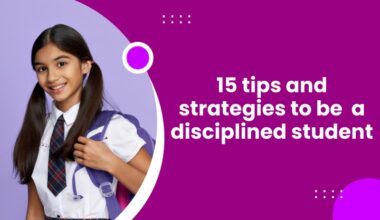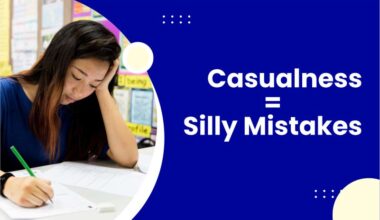What do you think the main aim of education is? This question can b thoroughly argued and debated upon but I believe the primary skill students learn in school or college, is learning how to learn. That is a critical life skill which everyone needs.
Unfortunately, many students lack this skill. Your child might love going to school and learning might be fun for them but if that enthusiasm is not translating into good grades for your kids, then you have work to do.
Scoring like a straight-A student essentially means learning how to learn and studying smarter. Here are 10 ways you can teach your child to study smarter and score higher.

1.Writing notes is better than typing
When it comes to note-making, the good old fashioned method of writing your notes is still a more efficient method than typing your notes on a laptop. This is because writing down what we need to study helps us remember things better. Writing involves a deeper cognitive-processing of the material than typing and hence, makes it a far superior method of remembering stuff. Typing is a good option when you have to write a lot or you plan to go over the material again later.
2.Testing frequently is a must
Many students make the mistake of reading passively, even multiple times, before exams. It might seems like a good idea to read the same material over and over again to remember it better but it actually does not work. Students who score higher test themselves frequently and it helps their brain prepare for the exam. It not only helps prepare your brain for better recall during the exam, but also helps you relieve much of the stress and anxiety one feels before the exam.
3.Use multiple methods to learn one thing
Whenever you are studying a topic, how many different sources do you use? Most students use only one, the text. These days, after online learning came to the forefront, more students are turning to online classrooms and videos to learn. Learning the same topic from multiple sources can give you more perspective and help you retain information better because it is engaging different parts of your brain.
Also, you can teach yourself using a variety of methods. For example, you can read a book on the topic or you can teach it to somebody else to clear up your own doubts. You can use traditional methods like mind mapping and note making as well.
4.Speak up and engage more in class.
If this was the pre-pandemic era, I would have told you to sit in the front desks in the classroom to better learn something. Sitting in the front helps you concentrate and learn better. However, since this is the post pandemic world and online learning is a thing, I will ask you to be more engaged during your online classes. Dozing off or zoning out in between lectures is a high risk for many and students. Not participating in the classroom is equal to sitting in the last benches inside a physical classroom. So, to study smarter you need to engage with your teacher. Ask questions, raise a hand if you know the answer, give additional points if you think they are relevant to the topic being taught. 40% of your lessons can be learned ahead if you pay attention in class!
5.Connect the dots.
Whenever you are reading a textbook, every piece of information should connect to something you have learned. Avoid learning concepts in isolation. For example, if you are reading about the political history of France, try to link it to what you know about dictatorship, monarchy and dictator-led governments we have today. If you can identify broader patterns, it becomes easier to organise all the information. Another subject where you can do this is mathematics. If you can move between concepts, reference one idea to help understand another, only then will you be able to understand the broader picture.
Books By Avinash Agarwal
6.Exercise and sleep at least 8 hours a night.
If your body is tired, how can your mind function? Exercising at least three times a week can drastically improve your life. It improves your brain function, your memory power and helps you sleep better which leads to better functioning throughout the day. As a result you will be full of energy and able to give your 100% to everything you do. Try 30 mins for three times a week and you will start seeing the results. Sleep is also critical to proper functioning. You should make it a point to get at least 8 hours of sleep every night.
7.Avoid Multitasking
Your brain can only perform one task successfully at a time. In essence when you multitask, you are actually switching between the tasks rather than engaging with both simultaneously. It reduces your efficiency and performance. A Forbes article cited a University of London study where it claimed that multitasking during cognitive tasks lowers the IQ of the individual. So even if you feel like you are multitasking efficiently, understand that you are only doing half the work you can do.
8.Take breaks
Take frequent breaks. It helps. For every 30-40 minute session, you should take a break of 5-10 minutes. Now you might feel like you are in the zone and completely fine with putting in 3-4 hours of study at one go but it will not work. In the long run that enthusiasm will die down because you are only depleting your mental reserves and not allowing your energy to replenish. Taking breaks in between helps you recharge and go back to studying with 100% focus.
9.Focus on the journey and not the result.
World renowned researcher, Carol Dweck mentions in her research that all the successful students, and even professionals for that matter, focus on learning or the journey more than performing or the result of the action. This is because these individuals employ what is known as the growth mindset, where the focus is on learning through failures and obstacles instead of achieving 90% or getting into a reputed institution. When we are focused on learning, our entire focus is on understanding the subject matter and as a result performing well in exams is a natural by-product.
10.Don’t forget to reward yourself.
Of course! If you do good work, give yourself a treat for a job well done. However, make sure that your rewards are not taking you away from your goal. For example, your reward for finishing a three hour study session should not be three more hours of TV or a large pizza that makes you sleepy afterwards. Rewards can be a glass of juice, a short walk, a few sets of exercise or a few minutes of listening to your favourite music.
So there you go. 10 tips to studying smarter, not harder. You don’t need to implement all of these tips at once. Start with the one you find the easiest and slowly move on the others. After just a week, you will start seeing results.


 Useful for all Parents/Teachers
Useful for all Parents/Teachers







